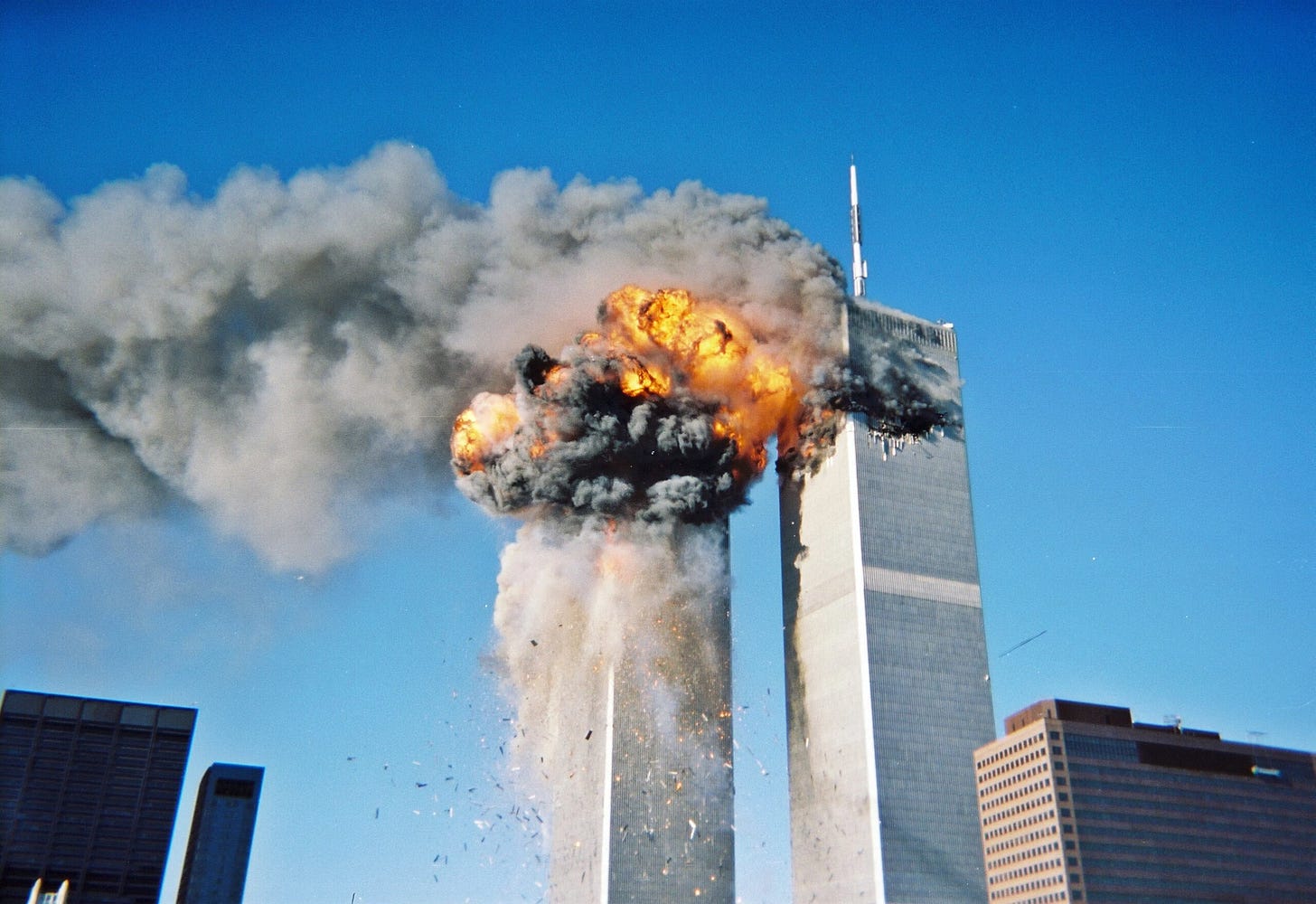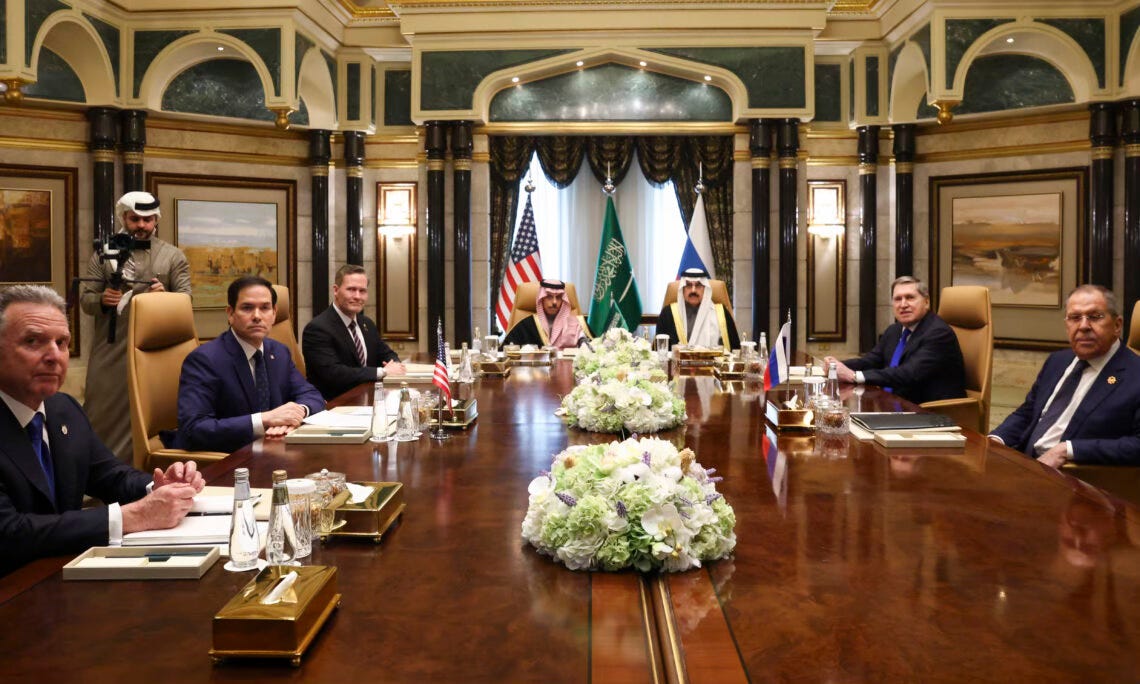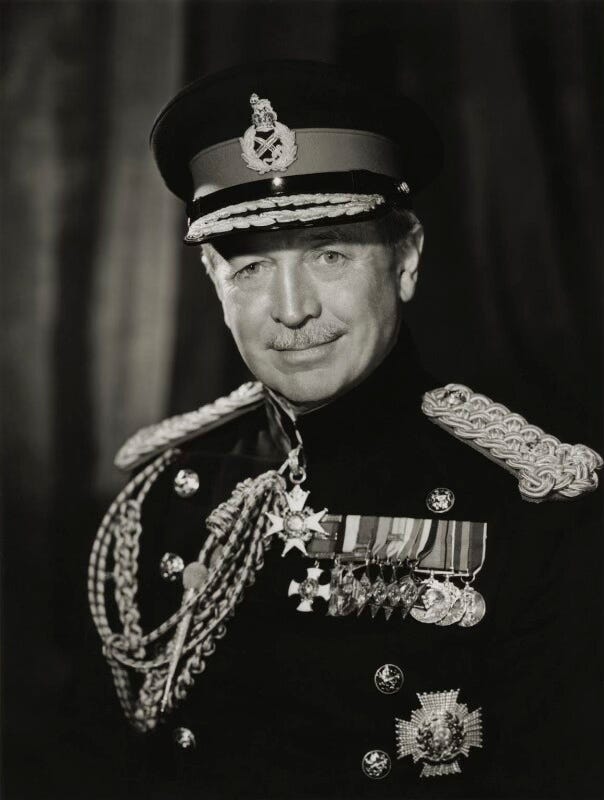If, like me, you have enough grey hair to vividly remember where you were when jets slammed into the Manhattan skyline on September 11, 2001, you remember the feeling.
The word everyone reached for was “surreal.” But that wasn’t quite it. What was happening was clear. But our sense of what the world is and how it works pushed back. This can’t be happening. But it is. But it can’t be.
We were suspended, floating, between vivid consciousness and a dream. It was a numb sense of unreality.
You have probably felt something similar in recent weeks as the United States threatened Denmark with war, Canada with Anschluss, and Ukraine with a Mafia shakedown. All while the Secretary of State burbled about the wonderful geopolitical and economic opportunities in “partnering” with Russia.
It was not a lot different than those jets slamming into New York skyscrapers. What’s happening is clear. But it can’t be happening. It is happening.
But it can’t be.
It is.
Let us confront reality squarely: The United States of America has abandoned its Atlantic friends and allies — the partnership that beat the Nazis and held off the Soviets and was the foundation of American and global security for 80 years — and sided with Russia.
Many commentators reached back to Munich and appeasement for an analogy. That doesn’t work for a host of reasons. The better parallel is the Molotov-Ribbentrop Pact between the Soviet Union and Nazi Germany, which stunned the world. These were mortal enemies. Cooperation between them was unthinkable. Until it happened. And it changed everything.
What followed, of course, was the Nazi invasion of western Poland and the Soviet occupation of the remainder of that tragic land. Then the Second World War.
It’s not hard to guess which role Ukraine is likely to play in this reboot.
If I had written these paragraphs a few months ago, they would have seemed deranged. Not least to me. But here we are — in a world in which even the understated, conservative voice of the Financial Times editorial board declares, “America has turned on its friends.”
But that feeling of unreality is where the parallel between 9/11 and today ends. In terms of its geopolitical and economic importance, and what it could mean for the future of liberal democracy itself, this moment dwarfs 9/11.
There it is again. That numb sense of unreality.
This can’t be happening.
But it is.
Longtime readers of this blog will know that a theme I keep repeating here, as well as in my books, is the failure of imagination.
When a presidential commission investigated the 9/11 attacks, it identified “a failure of imagination” as the key reason why America’s huge national security apparatus did not stop the attacks. The same failure recurs in large organizations, particularly governments, for both psychological and institutional reasons. The failure of imagination is everywhere. We suffer for it.
Please note the failure of imagination should not be understood as a failure to forecast. So much of reality is unforecastable. I’ve been banging on about the threat Trump poses since 2015 so I think I have better standing than most to claim I saw all this coming. In fact, the first time I raised this spectre in a meeting with a significant client was in early 2016. When I said the words “the Trump administration,” the room broke into laughter. After Trump was re-elected, I was despondent. I expected horrible things to follow. But this is so much bigger and worse. I cannot claim to have foreseen it.
No, a failure of imagination is something more basic than a failure to forecast.
The range of possible futures at any one time — “what could be” — is immense. In the abstract, people get that. The future is wide open. But in practice? That’s not how people think. We have tunnel vision. We think the range of possible futures we see is wide but what we actually imagine, compared to what is possible, is very narrow. Chop off the apparently “improbable” edges of that field of vision and you are left with people overwhelmingly feeling that was has been is what will be. Abrupt, severe, fundamental change is impossible — so the whole room laughs when I say, “the Trump administration.”
Remember, the phrase “President Trump” was a Simpsons punchline. It was literally a punchline. I could cite so many other examples like that. Hence, my diagnostic rule: If you see a range of futures whose outer edges do not include futures that strike you and everyone else as outlandish or downright ridiculous, you have tunnel vision.
The failure of imagination is a failure to grasp that history can suddenly veer off the plausible and crash straight into the absurd, the outlandish, the downright ridiculous. And when leaders don’t appreciate that — when they don’t allow for at least the possibility of the absurd — they make decisions that seem on their face to make perfect sense but are downright dangerous.
Think about how, for decades, businesses relentlessly pushed toward ever-more complex supply chains and just-in-time manufacturing. It squeezed out redundancies and inefficiencies. It made money. It made perfect sense! As long as what was expected to happen kept happening. But if, say, a previously unknown virus emerged and turned into a pandemic, or wind wedged a ship into a bank of the Suez Canal, or any of a thousand and one other extremely unlikely events happened, this elegantly efficient system would become a noose around your neck. Were those specific events predictable? No. But a very large number of very unlikely disruptions adds up to a very likely disruption. That should have given executives pause. But it didn’t.
That’s a failure of imagination.
Here’s a simpler example: In 2022, when Russia stunned the world by invading Ukraine, Canada joined its allies in rounding up military gear to support Ukraine. As the war progressed, the latest generation of self-propelled artillery has played a critical role on the battlefield, so how much of that did Canada send? None. Because Canada has none. Canada doesn’t even have self-propelled artillery from an earlier generation because, in 2005, with the Canadian Armed Forces’ budget being cut and cut and cut, planners decided to get rid of self-propelled artillery altogether. I’m sure few objected. After all, “when would we ever need that?” The answer turned out to be “seventeen years from now.” Could Canadian planners have foreseen Russia’s 2022 invasion or the key role self-propelled artillery would play in 2005? No. But could they have understood that there were a thousand and one possible futures in which we would desperately want self-propelled artillery? Yes.
That is a failure of imagination.
On a grander scale, look at Germany. When it first started making plans to mothball its nuclear power plants while expanding imports of Russian gas pipelines, the idea of a revanchist Russia hellbent on restoring the Empire with military force, assassination, sabotage, and electoral subversion was far-fetched, to say the least. Could Germany have predicted that? No. But Germany could have understood that there were a thousand and one possible futures in which its reliance Russian energy would be so crippling as to endanger national security. It did not.
That is a failure of imagination.
And of course I could scale this up to the whole of NATO and note that all NATO members, not only Canada, spent decades free-riding on an American Abrams tank. Why did we do that?
General Sir John Hackett, a top British officer in the 1960s, wrote about how politicians and bureaucrats decide how much to spend on the military: They see the roles the military plays now, they see the roles the military will be required to play in the immediate future, they calculate what the military needs to do this work. Done. In this way, they “seek tidiness over common sense,” Hackett wrote. The assumption is “that you need hardly do more than provide for the predictable, though it must be clear that armed forces, like insurance policies, are chiefly of value as provision against the unknown.” But he noted we are more actually more sensible about insurance policies than military funding: “The householder is not required to identify the burglar in advance.”
Could we have predicted the Lavrov-Rubio Pact years and decades ago? Of course not. But we could have understood that there were a thousand and one possible futures in which we would deeply regret free-riding and allowing our militaries to become so depleted. We are in one now.
I could go on. And on and on. But I think you get the point.
Now, while we are still experiencing that numb sense of unreality, we — the remaining liberal democracies of the West — must stop making the same damned mistake.
We need to recommit to each other, and to Ukraine, and to the principles of liberal democracy. We need to rebuild our militaries from the ground up with all the speed and urgency we can muster.
No more failures of imagination. Let’s get prepared. And stay that way.





I don't fully agree.
While I'm generally completely onboard with identifying our lack of imagination as a critical shortcoming, the limiting factor changes when we move from individual imagination to collective action.
For example:
There were a bunch of German politicians who warned against the reliance on cheap Russian oil. But their voices were ignored, so it's more a story economic power and Russian influence campaign skewing risk assessments, than a lack of imagination.
9/11 can be told differently, too. There is a great article on "The women who saw 9/11 coming". It's pointing out that many of the CIA analysts who observed the rising power of al-Qaeda were women, and their warnings ignored due to sexism, not lack of imagination.
So I just want to add the footnote that "Nobody could have seen this coming!" is also a convenient excuse for the ones in power who ignored the warnings of the ones who saw it coming.
trying again to make a simple comment. At the SAG awards yesterday apparently celebrity Jane Fonda said 'we are living in a Documentary right now and there are no auditions for it.' Something like that. Yeah, not huge smart comments like the others here, but still. Something to think about.
Gail B